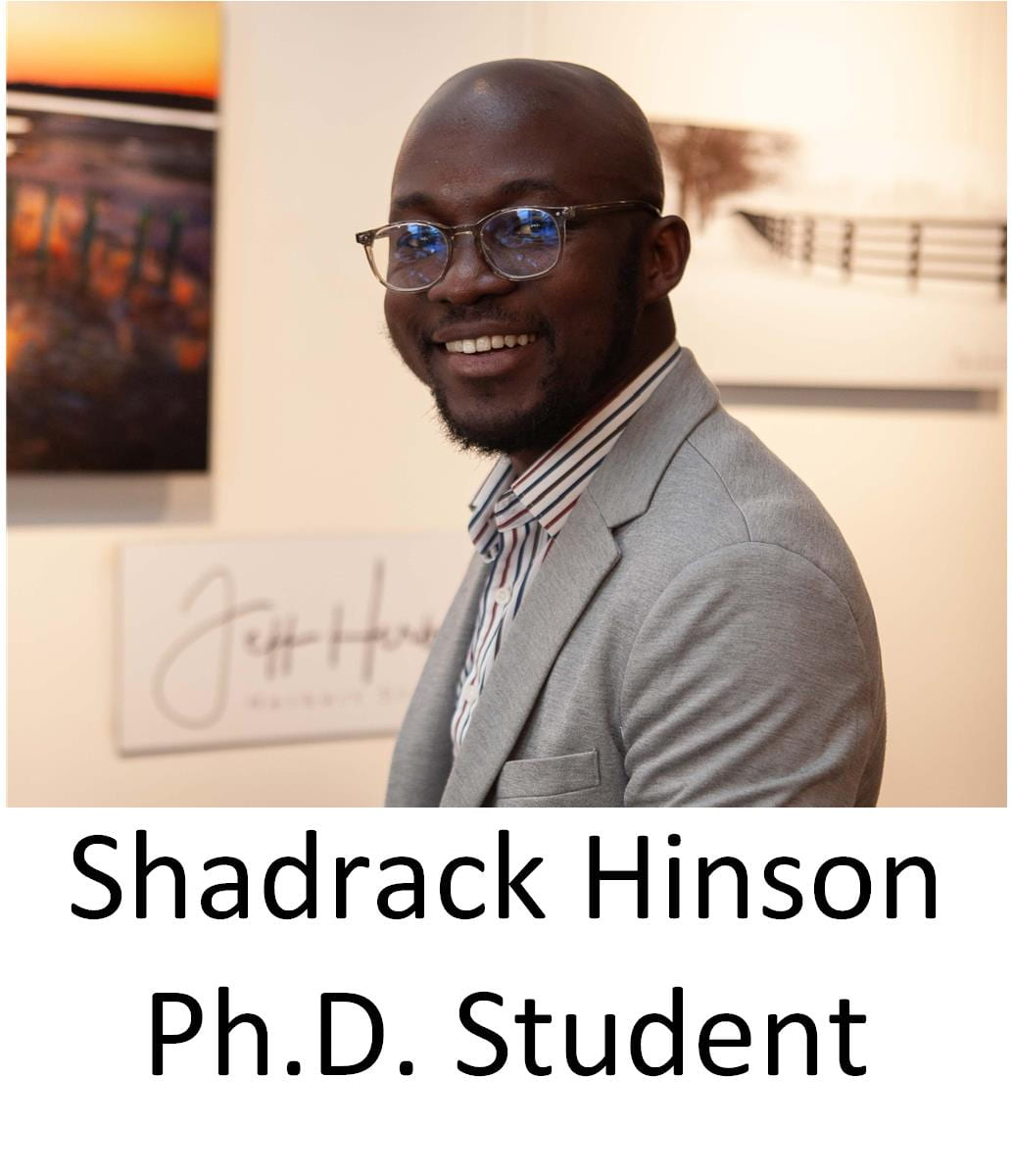 |
My name is Shadrack Hinson. I am from Whindo, Takoradi in Ghana. I completed my first degree in Environmental Engineering at the University of Energy and Natural Resources (UENR), where I developed a strong background in scientific research. I have always been dedicated to the idea of working toward solving environmental challenges. Climate-related challenges and their relevant mitigation measures always caught my attention, their effects are undeniable, clearly witnessed in most parts of the world. My visits to the Wharf, the Shipyard, the dredging lodge, and witnessing the Port expansion, during my 3-months internship at the Ghana Ports and Harbors Authority (Takoradi) piqued my interest in coastal engineering.
My vision has been to be part of research that provides coastal adaptation strategies to safeguard the coastal environment from natural coastal hazards. To fulfill this aspiration, I was thrilled to have had the opportunity to pursue an MSc in Water Science and Engineering, specializing in Coastal Engineering and Ports Development, at IHE Delft Institute for Water Education.
Currently, I am pursuing a Ph.D. at the Center for Applied Coastal Research – University of Delaware, supervised by Professor Jack Puleo. The focus will be on building community resilience using Nature-based solutions (living shoreline). Understanding the role of coastal wetlands, and the economic trade-offs that exist between anthropogenic activities and marine biodiversity are crucial for coastal communities. My interest will be on evaluate the ability of living shorelines in erosion reduction, protection against hydrodynamic forcing, increase biodiversity, and the provision of useful ecosystem services to local communities.
“Our greatest weakness lies in giving up. The most certain way to succeed is always to try just one more time” – Thomas A. Edison. “If my mind can conceive it, and my heart can believe it, I can achieve it” – Jesse Jackson. These quotes and my faith in God Almighty drive me. Outside the office, I am listening to some good Country music, cook a meal, play football, or have a chat over tea or coffee at the Trabant Hall. I love travelling and spending some time with family and friends cheers me up. I enjoy taking wildlife photography and can’t wait to start again!
|
 |
I grew up in Staten Island, NY, but I used to spend my summers in Cape May, NJ where I would spend everyday at the beach. I have always loved the beach, but I never thought of a career in Costal or Ocean Engineering until I worked on a research project in the Oceans Department at NAVFAC EXWC in Port Hueneme, CA during the summer 2019. Now, I hope to pursue a masters in Coastal or Ocean engineering. I am an undergraduate student majoring in Civil Engineering at the University of Delaware. When I’m not in school, I like reading, hanging out with friends, scuba diving, and traveling. |
 |
I am Rafiu Oyelakin, last born of mum and 6th in a family of 15. I came from Odeomu, where I had my basic 6 -3-3 education. I furthered my education at the Federal University of Technology, Minna, Nigeria, where I had my bachelor’s in civil engineering. After graduation, I worked with Mata Engineering and environmental services in collaboration with Nok Associated on the Development of wastewater policy in Nigeria for the Federal Ministry of water resources. Ten months down the job, I was awarded the prestigious Erasmus Mundus scholarship in the Flood risk management Joint organized by four consortia Universities. I Had my first semester at Technische Universität Dresden, Germany, focusing on hydro science and Engineering. The second semester was at IHE Delft institute of water education, Netherlands, with a major in water science and engineering. The third semester was jointly conducted by Barcelona tech, Spain and the University of Ljubljana, Slovenia. While in Barcelona tech, I developed an interest in coastal research during a coastal risk assessment task at the Maritime laboratory. My master’s research investigated climate change’s impact on flood patterns in China.
I will work with Prof Jack to improve our understanding of alongshore sediment transport and flow structure caused by obliquely incident waves at the swash zone.
In my free time, I like traveling by road, water, air, rail or, if possible, by broom. Feel free to invite me for all your volunteer and community engagement. I was hanging out with colleagues and dissecting contemporary issues around the world. I also love reading, cooking and random fitness exercises.
|
 |
My name is Alex Baffour Akoto. I was born and raised in Kumasi in the Ashanti region of Ghana. I obtained my Bachelors degree from the University for Development Studies, Tamale, Ghana. Growing up in a non-coastal environment, I was always happy to visit the beach. On my visit to one of the beaches in the volta region of Ghana, I realized most of their houses, resorts and other historical buildings have been affected by tidal bore. I felt very sad and thought of how I could help in solving our coastal problems. My interest in coastal engineering developed from this point.
I received a scholarship to pursue an MSc. Harbor, Coastal & Offshore engineering from Hohai University in China after my national service. Despite my background with no knowledge in coastal engineering, I was determined to make academic excellence by using resources from the school library, classroom, and online platforms. I understood the nexus of coastal engineering principles related to wave mechanics, sediment transport, and morphodynamics. During my master’s degree I engaged myself in research on modeling wave and sediment transport along the coast of Ghana. After completing my master’s degree, I was employed as a coastal engineer on a sea defense project in Ghana. My main task was to supervise all coastal works according to design specifications. These experiences attracted me to various research problems and made me pursue a Doctoral program at the University of Delaware. My research PhD will be focused on swash zone dynamics driven by oblique incident wave which will be supervised by Professor Jack Puleo. At my free time I enjoy taking a walk and listening to music.
|
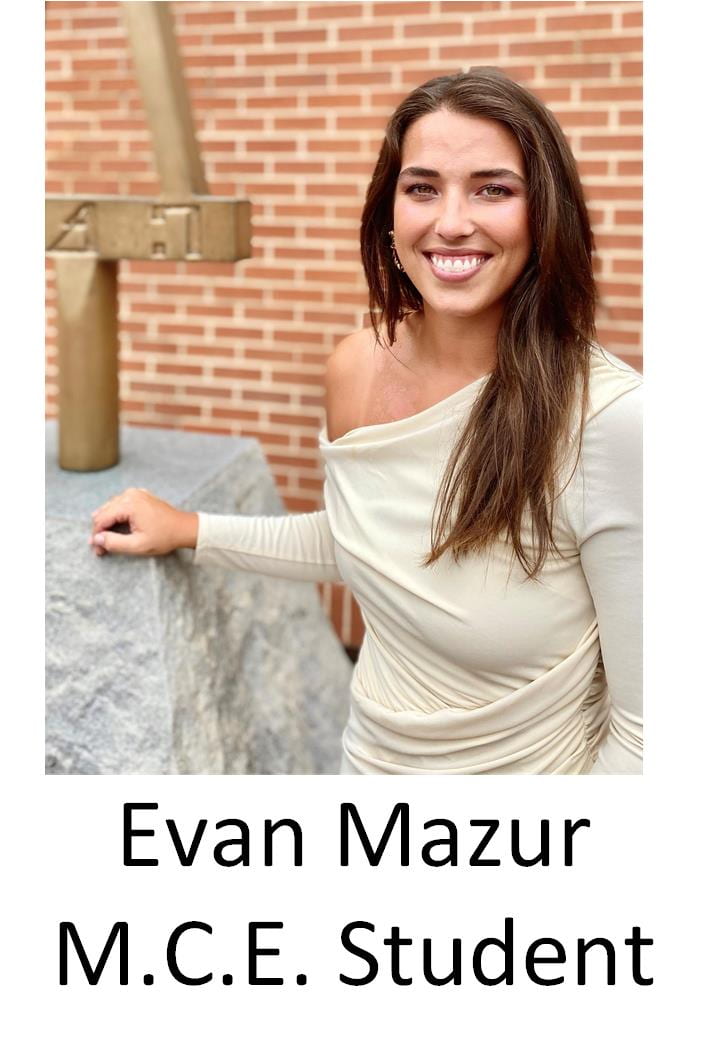 |
My name is Evan Mazur. I was born in Mobile, AL and lived most of my life in Cache, OK. While I learned a lot during my time on the plains, one of the most profound realizations was that I needed to get back to the ocean. I returned to Mobile, AL along the Gulf Coast, to study Civil Engineering at the University of South Alabama (USA).My fascination with coastal engineering stems from a personal connection to coastal life and its fickle nature. As a child, I loved going to the beach, and I remember the effects of hurricanes and powerful coastal storms on south Alabamians, my family included. My research efforts have been centered around the importance of preserving our culture through the development of resilient coastal communities. As a freshman in engineering, I developed a method capable of assessing the parameters governing impact and erosion of hurricanes on barrier islands using a numerical model. As an NSF REU recipient, I researched a regional hurricane workflow to compute damage and loss estimations of an entire region caused by a hurricane hazard at the University of California at Berkeley. As a NOAA Holling’s Scholar, I developed a workflow used to extract and attribute prominent shoreline hazards and navigable features from a 3D model generated from unmanned aircraft system (UAS) imagery.
As a Unidel Distinguished Graduate Scholar, I am excited and fortunate to continue my work aiding in coastal resiliency at UD with Dr. Puleo through working to development holistic storm impact regimes that include elevated water levels in the bay that can cause severe damage due to erosion.
In my free time I love to workout, go sailing with friends, spend time with family, and spoil my puppy Zella. I also graduated with a minor in vocal performance from USA and love all things opera and musical theatre. |
 |
My name is Olivia Amante. I am from South Kingstown, RI. Growing up I was obsessed with the
ocean, which makes sense since I was raised in the “Ocean State.” For my undergraduate
degree, I attended the University of Rhode Island where I majored in Marine Biology and Ocean
Engineering. It was clear over my time in college that I had a strong love for ocean engineering
and that I wanted to focus more intently on it. For my senior year research project, I studied
extreme storms and various erosion mitigation strategies. I am excited to continue my studies at
the University of Delaware. I am very excited to make the move from the smallest state to the
second smallest state!When I am not studying I enjoy exercising, hiking, going to the beach, and I am currently
working on a flourishing garden. |
 |
My name is Courtney Olney. I am originally from Airville, a small-town in Pennsylvania. I went to community college before earning my bachelor’s in civil engineering from University of Delaware in 2018.
Afterwards, I worked for an engineering consultant firm for two years. Not completely sure what field I wanted to work in, I started my career as a rotational engineer where I worked briefly with the Land Development, Natural Resources and Water Resources divisions. Due to my interest with water related subjects, I felt the Water Resources discipline was the best fit for me. I still was not completely satisfied with my line of work though, so I decided to earn my master’s degree in the field of coastal engineering because of my passion for the ocean.
I was interested in the modeling used in water resources and I am excited to advance my modeling skills by investigating hydrodynamics using an open source model under Dr. Puleo.
In my free time I love to hike, scuba dive, yoga, go to music festivals and poi. Anything outdoors and I am down! |
 |
My name is Oscar Williams. I am from Brooklyn, New York. I did my undergrad at SUNY Stony
Brook with a major in civil engineering. My introduction to coastal engineering was a slow burn. I
first took an oceanography course, followed by a fluid mechanics course, and finally a coastal
engineering course, where I fell in love with the complexity of coastal systems. Over this time
period, I also visited San Sebastian, Spain, a city with a robust coastal infrastructure and some
huge waves (I highly recommend watching these waves slam into a seawall by searching “San
Sebastian waves” on youtube). Seeing the efficacy with which the city has dealt with a volatile
coastal environment, along with seeing the problems that they still face, persuaded me to
become a coastal engineer. My hope is that soon I can do work to safeguard coastal cities to
protect the irreplaceable history and culture that lies within them.
I am currently working under Dr. Puleo on a project investigating the effects of ship wake on
living shorelines in the DE estuary.
In my free time, I enjoy biking, soccer, and basketball. I also spend a lot of time watching British
trivia shows. |
 |
My name is Cassie Turner. I grew up along California’s Central Coast. Despite my mom’s hatred of sand, living by the coast inspired in me a deep love for the ocean and the coast. I spent my undergraduate career at the University of Southern California and received a degree in Civil Engineering with a construction emphasis in 2018. At USC, I was introduced to coastal engineering and found it better fit with my passion than construction engineering.
After receiving my degree, I moved to the Mississippi Delta to teach middle school math and ultimately ended up staying two years, working both for a rural school and then a rural engineering firm. Working as an engineer in the Delta allowed me to experience the challenges faced in rural and agricultural communities, especially along the river, where significant floods are regular. I hope to continue to be a support to smaller communities with fewer resources after continuing my education. I will be assisting with the study of ship wakes on living shorelines at Pea Patch Island.
In my free time, I enjoy consuming a lot of true crime content and 80’s music, practicing mixed martial arts, and spending time with my two guinea pigs, Hershey and Ginger. |
 |
Hello! I’m Maro Pontiki, an enthusiastic and creative Civil Engineer from Greece. My civil engineering education was received at Aristotle University and it was accompanied by fascinating research into coastal erosion of three scenic beaches near my birthplace, Thessaloniki. After countless hours of field measurements and numerical modelling, Coastal Engineering captured my heart! By the end of 2015, I have obtained a master’s degree in Hydraulic and Environmental Engineering, as well as, a scholarship from the State Scholarship Foundation and I started working for a consulting company in beautiful Cyprus. There, I participated in the construction of Aquafragma; a patent flood barrier and I prepared several other significant projects.
In 2016, I had the honor to receive a scholarship of excellence from A.G. Leventis Foundation and I decided to continue my studies in coastal engineering; a field which was monopolizing my interest. The graduate program took place at both TU Delft and NTNU and in August 2018 I obtained master’s degrees from both universities. My thesis topic was based on the development of a Bayesian model for the prediction of damages on berm breakwaters in the Arctic and it was inspired by a course that I followed at the University of Svalbard. However, my involvement in an enthralling experiment on Sand Motor triggered my passion for experimental research and made me pursue doctoral studies at the University of Delaware. My research is now focused on the investigation of dune erosion under extreme wave and surge conditions with supervisor Professor Puleo!
Ancient Greeks used to say: “A healthy mind in a healthy body” and I am a great supporter of this quote too. I love intense sports and I prefer Jumba than romantic Salsa. I am still trying to improve my French and I am just happy whenever free time exists in my schedule for traveling and volunteering. |
 |
My name is Erika Beddings. I was born and raised in Pittsburgh, Pennsylvania with my two younger siblings. But I am not a fan of any of the sports teams.
I attended Penn State University for undergrad and received my degree in Meteorology in 2017. I became interested in the ocean after taking an oceanography class my senior year. I took two years trying to figure out what I wanted to do and working some odd jobs before I went back for my masters. I am working on a beach nourishment project under Dr. Puleo at Indian River Inlet.
In my free time, I enjoy watching true crime shows. I have a deep love for historic buildings and places, especially cemeteries. I hope to someday help preserve history in coastal areas.
A funny fact about me is that I have been terrified of going into the sea for most of my life. |
 |
My name is Mike Larner. I am from Orleans, Massachusetts where I spent my summers as an ocean lifeguard watching the beach change day to day. Having grown up on Cape Cod, my exposure to an always evolving interaction between the coast and the people who live there created a fascination in the ocean’s ability to provide both haven and hazard to those who are surrounded by it. I wish to continue studying and working with this interaction in the field of coastal engineering. Currently, I am an undergraduate student at the University of Delaware studying the effects of large vessel wakes on the morphodynamics of Pea Patch Island’s shoreline. Outside of school, I enjoy surfing, swimming, hiking, camping, and traveling. |
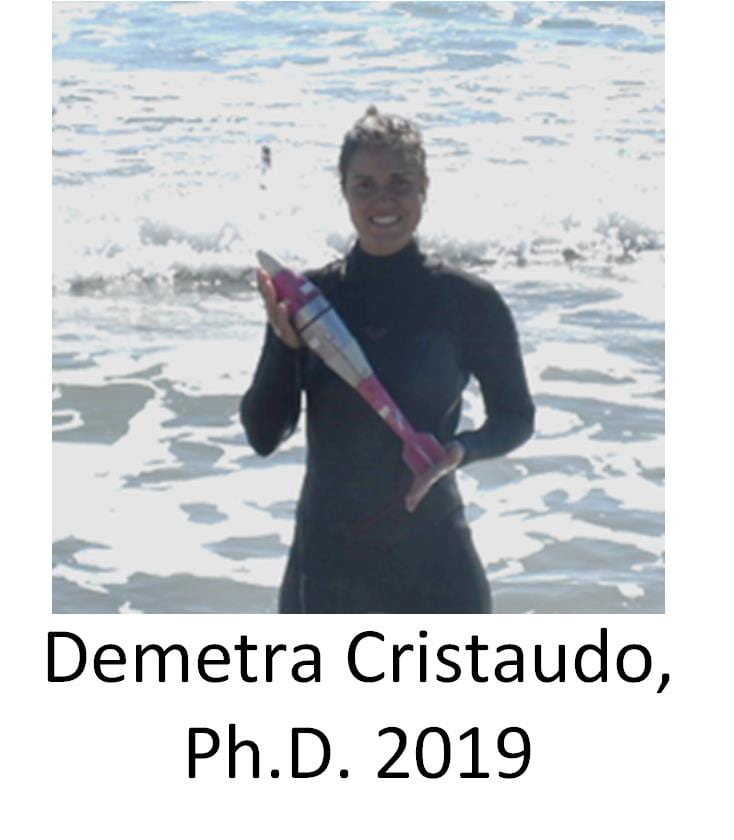 |
My name is Demetra Cristaudo. I was born and educated in Catania, a Sicilian city in the south of Italy. Truly, I am only half Italian since my mom is Polish and I used to visit my grandparents very often in Poland. My first 25 years were spent in Italy with very good food, beautiful weather and surrounded by beaches and sea as I am from an island.
I was always interested in scientific subjects and I decided to get a bachelor degree in Civil Engineering combining my inclination with the desire of building/creating and finding practical solutions. During my bachelor I found myself interested in the water-related courses and this is why I pursued a Master degree in Hydraulic Engineering. Here is where I discovered Coastal Engineering with one of my classes. My excitement for coastal engineering aroused thanks to Professors Foti and Musumeci and probably also because I assisted to strong rates of beach erosion in a beautiful town where I still use to go on vacation during the summer time, located in Sicily. I grew up in an island, Italy is surrounded by sea, therefore I was determined to point myself into the coastal area.
Well motivated and thanks to a scholarship, I had the opportunity to visit the University of Plymouth in the UK and work with Prof. Conley for few months for my Master’s thesis. After my experience in a research environment, I was triggered to continue performing research in coastal and this is how I flew overseas to study for my PhD at the University of Delaware.
At UD I work on mobility of munitions on the beach with Prof. Puleo. I had the chance to perform both large scale laboratory studies and field campaigns for my project which I really enjoyed. I am towards the end of my studies and I am very satisfied of the great professional and personal improvement I made here. |
 |
My name is Rory O’Boyle. I am an active duty U.S. Navy Civil Engineer Corps officer, a native of Gilbertsville, PA, and an avid Philly sports fan. I earned my bachelor’s degree in Civil Engineering from the
University of Delaware in 2010, and after graduation I joined the Navy.My first duty station was in 2011 at Norfolk Naval Shipyard in Portsmouth, VA, where I served as a construction manager. During my two years there, I oversaw more than 20 different projects as diverse as electrical utility upgrades, building renovations, and the construction of a new caisson for the dry dock that houses aircraft carriers.
In 2013 following my time in Virginia, I volunteered to serve on a Provincial Reconstruction Team (PRT) in Uruzgan, Afghanistan, where I served on a joint team comprised of US Army, US Navy, Australian Army, and civilians from the Australian Department of Foreign Affairs and Trade and the Australian Agency of International Development. I served as the PRT Engineer, Public Affairs Officer, and Information Operations Officer.
After leaving Afghanistan, I moved to Port Hueneme, California in 2014 to serve with the Seabees of Naval Mobile Construction Battalion (NMCB) FIVE. While at NMCB FIVE, I completed a deployment to Okinawa and to Camp Fuji, Japan, and I served in various jobs, including working in the equipment division, camp maintenance division, leading an independent team at Camp Fuji, and as the unit exercise training officer.
I left California in 2016, and headed to Rota, Spain, where I served at Commander, Task Force (CTF) 68, which oversees Navy Expeditionary operations throughout Europe and Africa. For one year, I was a Contingency Engineer, planning and managing Seabee projects throughout Europe and Africa. After that, I was part of the standup of a Mine Countermeasures (MCM) component of CTF 68, where we planned and oversaw operations to find and disarm mines in the sea.
My project with Dr. Puleo will continue my work in the MCM field, where I will study the burial of sea mines due to the effects of bottom sediment type and scour. |
 |
I was born in Colorado Springs, Colorado but my family and I moved to Wheeling, West Virginia shortly after my birth. I have always had an interest in nature and the environment which, combined with a passion for math and science, lead me on the path to pursue a career in civil and environmental engineering.
I completed my undergraduate studies at Stetson University (Deland, Florida) in May 2017 earning a Bachelor of Science in physics, as part of Stetson’s pre-engineering program. During the Fall 2016 semester, the east coast of Florida was heavily impacted by Hurricane Matthew and I (along with many other Stetson students) were forced to evacuate Deland. This experience helped me realize that I wanted to study the coast and pursue a graduate degree in coastal engineering. My research with Dr. Puleo involves the development and deployment of sensors to collect hydrodynamic and morphological data during extreme storm events. |
 |
I was born and raised in Baltimore, MD and have vacationed on the eastern shore since I was a kid. I attended Loyola University Maryland for my Bachelor’s degree in Mechanical Engineering, after developing interests for math, science and design in high school.
After working in industry for 2 years at a Consulting Engineering firm in Howard County, MD, I began searching for graduate degree programs and discovered the Coastal Engineering department at UD. I have always loved vacationing and traveling to different beaches across the world and decided it would be very interesting to study them as well. I will be helping Dr. Puleo study munition mobility on the beach face particularly in the swash zone, through experiments in an in-lab wave flume.
Outside of academia I like to spend my time outdoors and traveling. I also dabble in the fine arts particularly drawing and piano. Since growing up on the Chesapeake Bay I’ve learned to love blue crabs. |
 |
I grew up in Acton, a suburb of Boston. Spending summers on the Cape in addition to visiting family living on the waters of Maine and Connecticut gave me an appreciation for the coast. I began my undergraduate studies at the University of Maryland in 2011. I was involved in a four year multi-disciplinary research project concerning green roofs, which sparked an interest in a Civil Engineering degree.
Choosing the Water Resources track, in addition to taking a handful of landscape architecture classes furthered my appreciation for the natural landscape.Upon completion of my Bachelor’s winter of 2015, I began my Coastal Engineering Master’s program at the University of Delaware spring of 2016. My research involves a surf zone injury (SZI) project, focusing on five major DE beaches. Using meteorological, morphological, and hydrodynamic data collected over a span of four years, I hope to better understand SZI frequency at these five beaches. I will also evaluate the high impact forces on specific locations of the human body that a water user faces when knocked to the ground, following contact with a wave in the SZ. A goal of mine is to learn more about SZ processes and contribute SZI knowledge the coastal field.
Outside of academics, I enjoy traveling in the winter for a few weeks. The past few years I have been lucky enough to visit parts of Costa Rica, Australia, New Zealand, Ecuador, and the Galapagos. In my free time I enjoy the outdoors, swimming, concerts, collecting albums on vinyl, Boston sports and Terp games. |
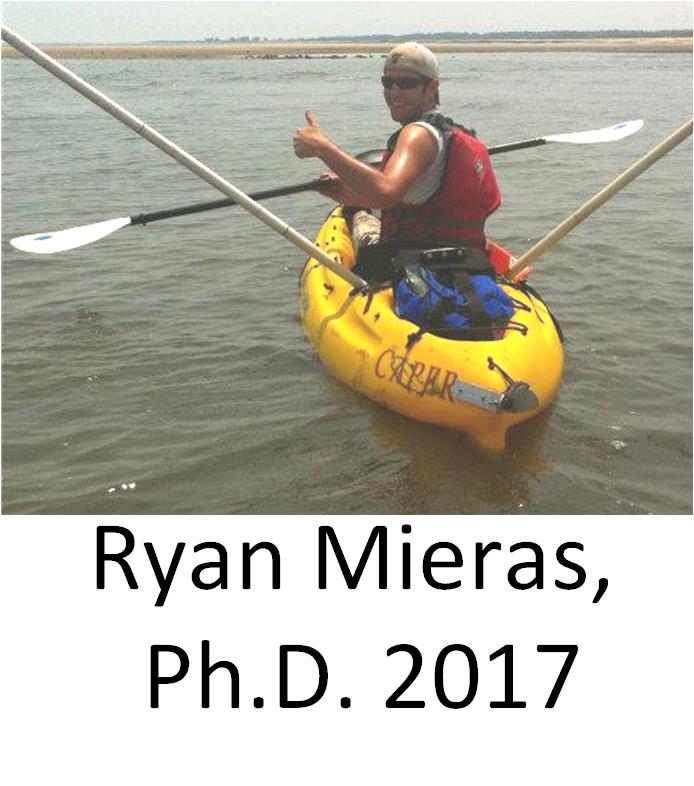 |
I was born and raised in San Antonio, TX, which is located in southern Texas on the edge of the beautiful Texas Hill Country. Aside from the Hill Country, San Antonio is known for some of the best Mexican food and BBQ in the country, the River Walk, the world famous Alamo, and a rich military tradition, as evidenced by the city’s nickname: Military City USA. Although San Antonio is situated more than 2 hours from the Texas Coast, I always had an interest in hurricanes and their impacts on coastal areas.
This passion inspired me to pursue a degree in Ocean Engineering at Texas A&M University, home of the Fightin’ Texas Aggies. In 2011, I earned my B.S. in Ocean Engineering from Texas A&M. A research-based summer internship with the Navy in 2010 motivated me to pursue graduate school at the Center for Applied Coastal Research at the University of Delaware. In the spring of 2014, I earned my Master’s Degree under the supervision of Dr. James T. Kirby, where I studied tidal propagation through salt marshes with complex channel networks. The subsequent summer, in 2014, I began my Ph.D. work under the supervision of Dr. Jack A. Puleo, also at the University of Delaware. Currently, I am working to better understand how sediment in the near-bed regime is transported under surface waves in the surf-zone.
When I’m not working on Coastal Engineering, I enjoy brewing my own beer (and drinking it, of course), cooking Texas-style BBQ, solving Rubik’s Cubes (I currently have 60 different cubes), and dancing the night away at music festivals, as well as DJing at parties and night clubs under the rather fitting name: Deep Water Limit. |
 |
I am from Calvert County, Maryland, which is on the Chesapeake Bay. Outside of school I am a fencer and a long-distance runner. In the spring of 2015 I graduated from the University of Delaware with a Bachelor of Civil Engineering degree. My undergraduate senior thesis focused on using statistical image analysis to determine sediment velocities in the near-bed region of the swash zone. I began pursuing a M.C.E Degree at the University of Delaware in the summer of 2015. My research has focused on using GPS-equipped drifters to map currents around the Indian River Inlet. |
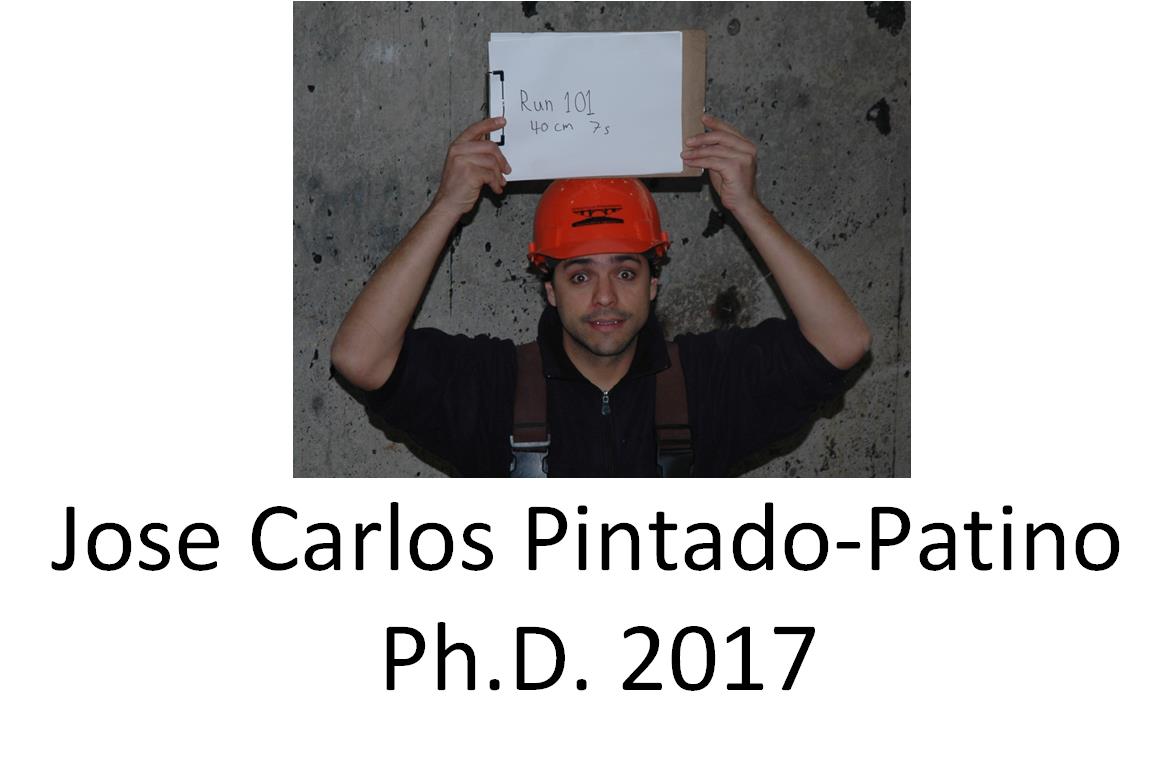 |
I was born and raised in Mexico city with a strong familiar background directed towards arts and literature. However, the variety of coastal landscapes, coastal communities and the nature of ocean waves always captured my attention. After studying and working as a photographer for some years, I made my undergraduate studies in ocean sciences at the Universidad Autonoma de Baja California (2003-2007). At that time, the program of studies took 4 or 5 years and had a final area of specialization which I did on physical oceanography. After a year of involvement in oceanographic surveys, I was granted with an “Erasmus Mundus” scholarship that allowed me to earn a M.S. degree in “Coastal and Marine Engineering and Managment -CoMEM” in the following two years (2008-2010) at the NTNU, UPC and TUDelft. Shortly afterwards, I was granted with an even better gift: a wife and son. In summer 2012, I started my Ph.D. studies at the Laboratorio de Ingenieria y Procesos Costeros-Universidad Nacional Autonoma de Mexico (LIPC-UNAM). Recently, the Fulbright-Garcia Robles grant (2014-2015) allowed me to undertake a research stay at the University of Delaware. My current research is directed towards fundamental knowledge on swash zone dynamics through numerical, laboratory and field work approaches. |
 |
I was born and raised in the beautiful Caribbean island of Puerto Rico. Being surrounded by sandy beaches, mountains, palm trees, and tropical breezes, I spend my time enjoying the outside activities, especially in the ocean (swimming, diving, paddle boarding and surfing). I earned my undergraduate degree in Civil Engineering by 2012 and, in the spring of 2013, my M.S. Degree in Environmental and Water Resources Engineering, both at the University of Puerto Rico, Mayagüez Campus (RUM). By the fall of 2013, I started my PhD studies in Coastal Engineering at the University of Delaware and joined the Center for Applied Coastal Research. My research is focused in swash-zone hydrodynamics and sediment transport processes to understand the forces controlling the foreshore changes during storm and sea-breeze conditions. |
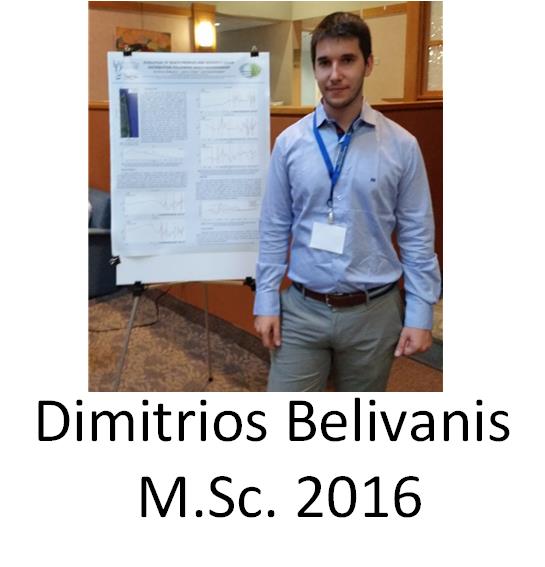 |
I was born and raised in a small town of Crete, the biggest of the many islands of Greece and the southernmost of Europe. Living nearby the sea had a great influence on me. As I was growing up I was getting more and more fascinated by the unpredictable nature of the sea. Being involved with mathematics in a competition level, I decided to study civil engineering in Thessaloniki, the major city in the Northern part of Greece. I did a five year degree (diploma) with a specialization in environmental and hydraulic engineering. My thesis subject was the use of artificial reefs as a submerged breakwater. During my studies I participated two times in European student exchange programs, the subject of which was the management of fluvial systems and port economics. In 2014, I decided to cross the Atlantic and continue my studies at the University of Delaware, where I am currently doing my Masters in ocean engineering. My research goal is to assess the effects of beach nourishment in beach morphology and provide guidance for future projects. As student of Dr. Puleo I have participated in multiple field experiments and gained experience in field testing and monitoring. My hope is to further expand my knowledge and contribute to the field of fluid dynamics in the following years. |
 |
I am from Bangladesh which is located on the northern shore of the Bay of Bengal in South Asia. I grew up in Dhaka, the capital and the largest city of the country. I pursued a B.Sc. in Civil Engineering in 2009 from Bangladesh University of Engineering and Technology (BUET). I earned an M.Sc. in Coastal and Marine Engineering and Management (CoMEM) from Delft University of Technology (TU Delft) in the Netherlands. During that period of study, I also went to the Norwegian University of Science and Technology (NTNU) and the University of Southampton in UK for different course work. I came to USA in fall 2014 for graduate study at the University of Delaware and at the same time started to work on a project as a research assistant at the Center for Applied Coastal Research. My research focuses on the beach and surf zone modifications due to beach nourishment. The aim of the project is to provide guidelines to adapt the most suitable nourishment practice on the Delaware beaches.
I like traveling and photography. I am very passionate about cricket and love to play this game whenever I get the opportunity. |
 |
I am originally from Utrecht, the Netherlands. My hometown is a beautiful historic city that dates back to the Roman age. Most of the current city center was built in the 1500s and 1600s, and has some typical Dutch canals. The Dutch city life is designed around cycling, and bikes are the best way to get around in any city. I did my undergraduate degree in Earth Sciences at Utrecht University starting in 2006. Three years later I began my M.S. degree in Physical Geography also at Utrecht University, which I finished in the fall of 2011. At the beginning of 2012 I moved to the United States to pursue my Ph.D. in Geology at the University of Delaware. I have since then been working at the Center for Applied Coastal Research studying hydrodynamics and sediment transport in tidal marshes. We have collected data for my research over the last four years in large field experiments in several tidal marshes in Delaware. |
 |
I was born in Somers Point, New Jersey and grew up in Brigantine, a small barrier island in southern New Jersey. I grew up on Brigantine’s beautiful beaches and spent the majority of my time surfing, fishing, swimming, wakeboarding, and hanging with friends and family. Surfing is my absolute favorite thing to do and I have been very fortunate to visit many different places to surf, such as Puerto Rico, Costa Rica, and Mexico. Music is also a big part of my life and I enjoy attending concerts and making my own music on the guitar. I obtained my undergraduate degree in Civil Engineering in 2013 and my Masters degree in Coastal Engineering in 2015, both from the University of Delaware. During my time as a Masters student I worked on several field research campaigns in a range of different environments. I learned how to deploy and collect data with many sensors, specifically ADCPs, and completed many successful ADCP deployments along the Delaware coast and in Yucatan, Mexico. My focus was on collecting field data and using it to quantify the littoral processes offshore of an erosive beach downdrift of the stabilized Indian River Inlet in southern Delaware. I have recently completed my thesis on the findings from this research and am currently searching for a job in the field of ocean/coastal research. |
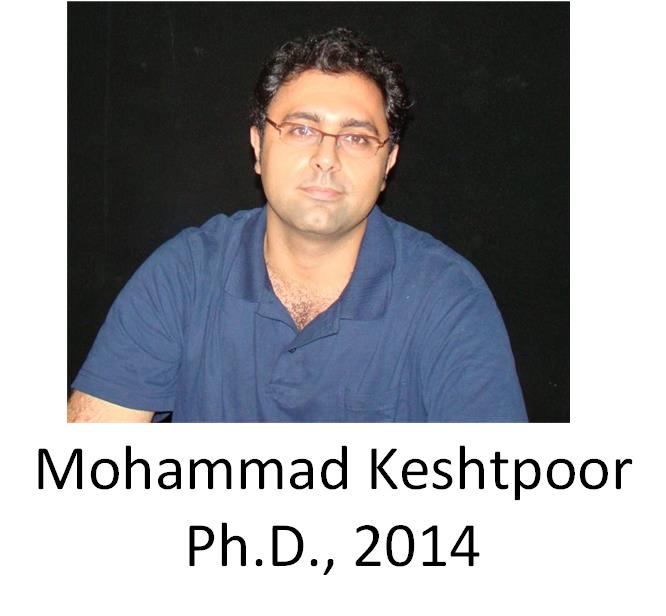 |
In 2005, I received my B.S. degree in civil engineering from Iran University of Science and
Technology, and then, was admitted to the school of Civil Engineering at University of Tehran to study Hydraulic Engineering for M.S. degree. My M.S. thesis entitled “Numerical Modeling of Transient Flow in Water Supply Systems using Differential Quadrature Method” was passed with the highest grade. After two years of full-time industry experience (2007 – 2009), I started my Ph.D. studies in Coastal and Ocean Engineering program at the University of Delaware (UD). During my graduate studies at UD I worked on complex patterns of hydrodynamics, sediment transport, and morphodynamics in an inlet-beach system. Statistical and numerical techniques were used to hammer the complexity of waves, currents and sediment movement near the Indian River Inlet, DE. I defended my thesis in 2015 and started my professional career at Michael Baker International as a coastal engineer. Probabilistic modeling of cyclonic events (hurricanes) and numerical modeling of storm surge formed my main responsibilities at Baker. Since March 2016 I started a new role at AIR Worldwide to help the storm surge modeling group in their worldwide studies.After work, I spend my time with my wife. We usually go for a walk, or swimming, and then watching a movie or a reality show wraps up our day. On weekends, nothing is more enjoyable than having fun with a group of friends. |
 |
I was born and raised in Belgium, a country whose actual existence is still disputed among experts. I obtained my BSc and MSc in Civil Engineering at Ghent University in 2007 and 2009. Then I did a PhD in Ocean Engineering at the University of Delaware between 2009 and 2014, investigating near-bed sediment transport and turbulence in the swash zone. During my PhD, we built the Conductivity Concentration Profiler (CCP) sensor, and managed to collect enough data with it in between instrument leaks and malfunctions to write a dissertation.
After obtaining my PhD, I became a consultant at IMDC in Antwerp Belgium, where I work on projects ranging from metocean studies, coastal protection, to the studying the impacts of dredging on estuarine turbidity.
Aside from that, I love cycling, going to concerts, and washing it all down with a good Belgian beer. Cheers! |
| Tiffany Roberts (Ph.D. 2012; University of South Florida; co-advised with Dr. Ping Wang) |
|
 |
I grew up in the Chicago-land area, in a town known as Park Ridge, IL. I went on to get my B.S. degree in Civil Engineering from Rose-Hulman Institute of Technology in Terre Haute, IN. After that, I obtained my M.C.E. in Ocean Engineering from the University of Delaware. During my time at UD, I collaborated with Dr. Puleo and Dr. McKenna on research related to the “experimental examination of the effect of observation geometry on land surface temperature estimates from remotely sensed ground based thermal imagery.”
After completing my Masters, I moved to Maryland and worked for an international Engineering, Procurement & Construction Company called Bechtel for 3 years. My time there was spent on nuclear generation and multiple domestic & international overhead power line projects. I now have a home in Western Washington and work at the local utility (Puget Sound Energy) as a Senior Engineer in the Electrical Systems Engineering group. At PSE, I balance my time between office work and exploring the beautiful outdoors, where our power lines often reside.
Outside of work, I enjoy trying out different microbreweries and brewpubs with my girlfriend, hiking along one of the many trails with my dog, working on my house, or just relaxing with a movie. |
 |
Autumn Kidwell graduated from Texas A&M University in 2009 with a BS in Ocean Engineering and was named the Outstanding Ocean Engineering Student of the year. During her undergraduate degree, she worked at the Karlsruhe Institute of Technology in Karlsruhe,Germany. She completed her MCE in Coastal Engineering at the University of Delaware in 2011 as a National Science Foundation Graduate Research Fellow. Her Masters Degree was done under the supervision of Dr. Jack A. Puleo. The project goals were to better understand sediment transport in the inner surf and outer swash zone. Autumn finished her PhD at the University of Delaware in 2016 with a focus on Physical Oceanography and ENSO. She was a NASA Delaware Space Grant Fellow and published in the Journal of Climate and the Journal of Geophysical Research-Oceans. She currently resides in Austin, Texas, and works as an Engineering Scientist researching underwater acoustics at the UT Applied Research Laboratories. |
| Christina Lindemer (M.C.E. 2010) |
|
| Betsy Hicks (M.C.E. 2010; co-advised with Dr. Nobu Kobayashi) |
|
| Joe Faries (M.C.E. 2009) |
|
| Jesse Hayden (M.C.E. 2009) |
|
 |
Nathaniel Pearre is a Post-Doctoral Fellow working with the Renewable Energy Storage Lab. His research focus is both on the forecasting of renewable resources and on optimal sizing strategies for storage.
With a background in Mechanical Engineering, Nat spent several years in industry working in manufacturing engineer and composites. He returned to graduate school at the University of Delaware as a coastal engineer (M.C.E. 2007), assembling camera systems and writing automated image processing software to quantify shoreline change on the Delaware coast. During that work he was inspired by an offshore wind power class to pursue his interest in renewable energy. He went on to pursue a doctorate at UDel with the Center for Carbon-free Power Integration, focusing on the potential of a distributed fleet of EVs to provide grid services through Vehicle-to-Grid, a technology that permits plug-in vehicles to respond to market forces and send stored energy back to the grid.
Nathaniel was pleased to be able to spend the 2011 summer as visiting student at Dalhousie, bringing him home to Halifax, and giving him a chance to learn about Nova Scotia’s energy future. During his summer research at RESL he investigated energy storage systems (capacity, power, mass, volume) to meet the objectives of the Nova Scotia Renewable Electricity Plan. His research produced two peer-reviewed papers, and a suite of energy modelling software (in Matlab) that has been used and extended by RESL in numerous subsequent projects. |
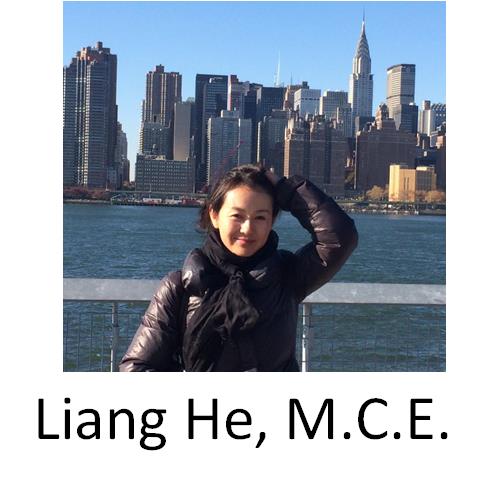 |
In 2004, I finished my graduate studies at Dalian University of Technology, China, with the major of Naval Architecture and Ocean Engineering and started my study for master degree in coastal engineering at the University of Delaware (UD). During my two and half year study under supervision of Dr. Puleo, I finished the required course work. Besides that, I extensively studied the rip current dynamics both in theory and experiments. For my research work, we used particle image velocimetry (PIV) to investigate the variability of rip currents over variable topography. I also participated in several beach site visits for beach profiling and measurements and attended an ICCE conference. I had my master thesis defense in 2006 (M.C.E) and started my professional career in 2007 with Halcrow (CH2M now). As a coastal engineer in ports and maritime business group, I worked on a variety of projects, from port planning in Middle East to small shoreline resilience project in New York area, from wave transformation/agitation modeling to mooring and navigation studies. For the past few years, I have settled down in the New York area with my family and enjoy working as a coastal engineer in the city. |
